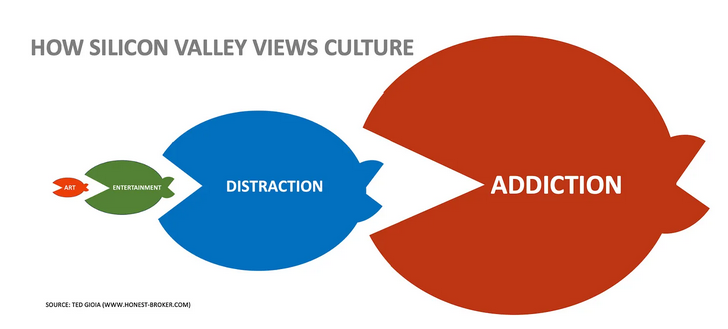Ted Gioia thinks the annual “State of the Union” address is boring, but a much more relevant thing would be a “State of the Culture” address … and he’s got lots of concerns about modern day culture:
Many creative people think these are the only options — both for them and their audience. Either they give the audience what it wants (the entertainer’s job) or else they put demands on the public (that’s where art begins).
But they’re dead wrong.
Maybe it’s smarter to view the creative economy like a food chain. If you’re an artist — or are striving to become one — your reality often feels like this.
Until recently, the entertainment industry has been on a growth tear — so much so, that anything artsy or indie or alternative got squeezed as collateral damage.
But even this disturbing picture isn’t disturbing enough. That’s because it misses the single biggest change happening right now.
We’re witnessing the birth of a post-entertainment culture. And it won’t help the arts. In fact, it won’t help society at all.
[…]
Here’s a better model of the cultural food chain in the year 2024.
The fastest growing sector of the culture economy is distraction. Or call it scrolling or swiping or wasting time or whatever you want. But it’s not art or entertainment, just ceaseless activity.
The key is that each stimulus only lasts a few seconds, and must be repeated.
It’s a huge business, and will soon be larger than arts and entertainment combined. Everything is getting turned into TikTok — an aptly named platform for a business based on stimuli that must be repeated after only a few ticks of the clock.
TikTok made a fortune with fast-paced scrolling video. And now Facebook — once a place to connect with family and friends — is imitating it. So long, Granny, hello Reels. Twitter has done the same. And, of course, Instagram, YouTube, and everybody else trying to get rich on social media.
This is more than just the hot trend of 2024. It can last forever — because it’s based on body chemistry, not fashion or aesthetics.
Our brain rewards these brief bursts of distraction. The neurochemical dopamine is released, and this makes us feel good — so we want to repeat the stimulus.
[…]
So you need to ditch that simple model of art versus entertainment. And even “distraction” is just a stepping stone toward the real goal nowadays — which is addiction.
Here’s the future cultural food chain — pursued aggressively by tech platforms that now dominate every aspect of our lives
The tech platforms aren’t like the Medici in Florence, or those other rich patrons of the arts. They don’t want to find the next Michelangelo or Mozart. They want to create a world of junkies — because they will be the dealers.
Addiction is the goal.
They don’t say it openly, but they don’t need to. Just look at what they do.








